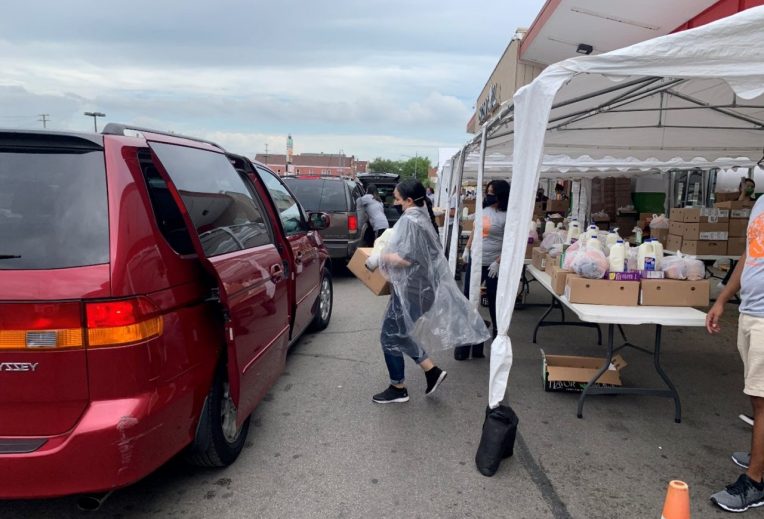“Pivot” has been the defining action word as non-profit organizations, throughout the city of Chicago, have found new ways to continue serving community members in response to the coronavirus. Three miles apart, Latinos Progresando and Breakthrough, both partners with ISU’s National Center for Urban Education through the Chicago Teacher Education Pipeline (CTEP), have demonstrated exemplary models of sustaining and shifting services in order to best support their communities. In doing so, both organizations followed city and state recommended guidelines, prioritizing health and safety, as they creatively responded to crucial community needs.
Latinos Progresando (LP), in operation for 22 years, is located in the Little Village neighborhood on the southwest side of Chicago. Eighty percent of residents are of Mexican descent. Many are foreign-born; others have lived in the community for many generations. Known throughout the city for offering the highest quality of immigration legal support to families, LP was committed to continuing this service despite the difficulties presented by Chicago going into “lockdown” mode for many months.
Though COVID-19 brought much of daily life to a temporary standstill, time-sensitive immigration needs remained steady. LP’s doors had to close for their usual in-person intakes and consultations, however, an immigration hotline was initiated. Staff worked diligently, offering immediate virtual responses to callers, making them feel comfortable enough to tell their complicated life stories. With dramatic US government filing fee increases scheduled to kick in soon, LP was committed to processing paperwork as quickly as possible for pending cases. In total, staff filed more than 850 applications from April to September.

The Little Village community has been hit hard by COVID-19, reporting some of the highest levels of coronavirus cases in the city. Early on, LP organized a virtual town hall meeting for community members to hear directly from Mayor Lori Lightfoot, and the Chicago Dept of Public Health Commissioner. Shortly thereafter, a free COVID testing site was opened in the parking lot at Saucedo, a neighborhood elementary school. LP’s newsletter, regularly updated and widely distributed, offered a bi-lingual comprehensive community resource guide.
LP responded to the impact of COVID-19 with other significant support. Help was offered to business owners to keep them afloat, including assistance with sidewalk license applications. In addition, staff assisted with distributing donated masks and PPE for street vendors and restaurants. Lastly, families who did not receive federal government stimulus checks were supported through the complicated process of applying for rental assistance.
In August, Latinos Progresando and The Marshall Square Resource Network partnered with The Greater Chicago Food Depository and the office of the 12th Ward Alderman to host a pop-up food pantry at the Little Village Discount Mall. All five Saturdays in August, drive and walk through options offered food, PPE, and census information to more than 3,000 families from the neighborhood and across the region.

September marked yet another pivot of services as Chicago Public Schools (CPS) began the school year with virtual remote instruction. LP is part of the Chicago Connected project and has the goal of connecting 7,000 households to free internet services. CPS identified families having connectivity issues and the initial expectation was that LP could simply hand over Comcast connection information to families. Ana Mosqueda, the LP community liaison with CTEP, was tasked with overseeing this program and quickly discovered that the process was far more complicated. Lengthy three-way calls with Comcast were necessary, even for families not needing Spanish interpretation because there were so many complicated family situations to explain, all hurdles to quick connection. Mosqueda, realizing that the complications are limitless, has become the troubleshooter for the most difficult and time-consuming cases. Other LP staff continue to call families informing them of the opportunity for free internet connection.
Luis Gutierrez, founder and CEO of LP, and the organization’s dedicated staff have demonstrated an unwavering commitment to the Little Village/Marshall Square community. And looking ahead to the future, even during these most troublesome times, LP remains on track with its plan to convert an abandoned neighborhood library into a new community center.
Illinois State University’s National Center for Urban Education is proud to partner with community-based organizations that stand ready to pivot to support their neighborhoods whatever comes.
Click here to learn more on Breakthrough.

